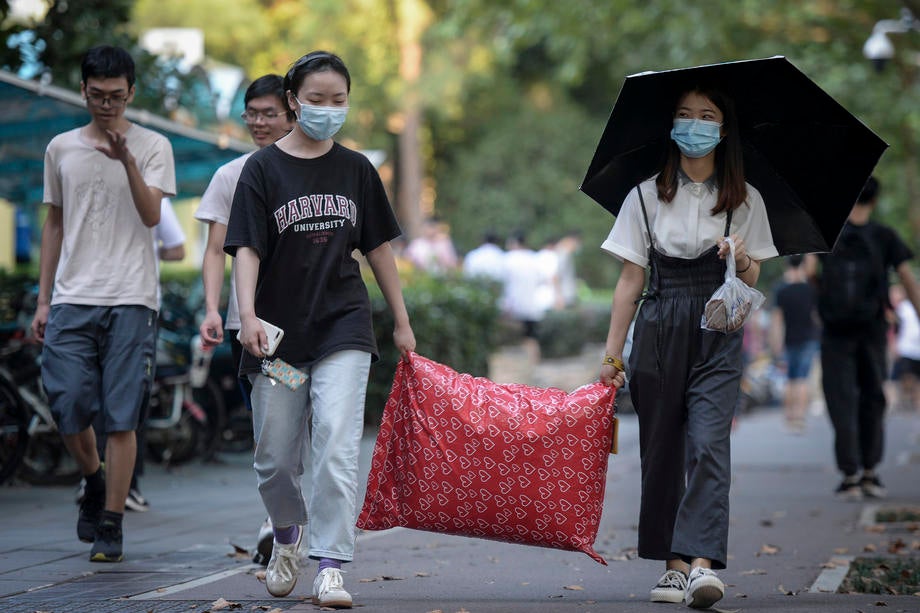Citizen journalist faces court case over Wuhan reporting
Zhang Zhan, 37, will go to court on Monday in the first known trial of a chronicler of China’s coronavirus crisis

In one video, during the lockdown in Wuhan, China, she filmed a hospital hallway lined with rolling beds, the patients hooked up to blue oxygen tanks. In another, she panned over a community health centre, noting that a man said he was charged for a coronavirus test, even though residents believed the tests would be free.
At the time, Zhang Zhan, a 37-year-old former lawyer turned citizen journalist, embodied the Chinese people’s hunger for unfiltered information about the epidemic. Now, she has become a symbol of the government’s efforts to deny its early failings in the crisis and promote a victorious narrative instead.
Ms Zhang abruptly stopped posting in May, after several months of dispatches. Police later revealed that she had been arrested, accused of spreading lies. On Monday, she will go to court, in the first known trial of a chronicler of China’s coronavirus crisis.
Ms Zhang has continued to challenge the authorities from jail. Soon after her arrest, she began a hunger strike, according to her lawyers. She has become gaunt and drained but has refused to eat, the lawyers said, maintaining that her strike is her form of protest against her unjust detention.
“She said she refuses to participate in the trial. She says it’s an insult,” said Ren Quanniu, one of the lawyers, after visiting Ms Zhang in mid-December in Shanghai, where she is being held.
Ms Zhang’s prosecution is part of the Chinese Communist Party’s continuing campaign to recast the government’s handling of the outbreak as a succession of wise, triumphant moves. Critics who have pointed to officials’ early missteps have been arrested, censored or threatened by police; three other citizen journalists disappeared from Wuhan before Ms Zhang did, although none of the rest has been publicly charged.
Prosecutors accused Ms Zhang of “picking quarrels and provoking trouble” — a frequent charge against government critics — and recommended between four and five years in prison.
“She was shocked,” Mr Ren said. “She didn’t think it would be that heavy.”
Ms Zhang was one of a wave of journalists, professionals and amateurs who flocked to Wuhan after the lockdown was imposed in late January. Authorities were preoccupied with trying to manage the chaos of the outbreak, and for a brief period, China’s strict censorship regime loosened. Reporters seized that window to share residents’ raw accounts of terror and fury.

Ms Zhang had never been a citizen journalist before traveling to Wuhan from Shanghai, where she lived, said Li Dawei, a friend who exchanged messages with her often while she was reporting. But she was stubborn and idealistic, he said, to a point that was sometimes difficult to understand.
Ms Zhang appeared to know the risks of her actions. In one of her first videos, on 7 February, she mentioned that another citizen journalist, Chen Qiushi, had just disappeared, and another, Fang Bin, was under surveillance. Whistleblower doctors had been silenced, she added.
“But as someone who cares about the truth in this country, we have to say that if we just wallow in our sadness and don’t do something to change this reality, then our emotions are cheap,” Ms Zhang said.
Not long after, Mr Fang disappeared. So did Li Zehua, another citizen journalist who had travelled to Wuhan. China’s leader, Xi Jinping, had recently ordered officials to “strengthen the guidance of public opinion”, and hundreds of journalists from state media were deployed to the city.
The crackdown also extended to people who had tried to document the crisis in less direct ways. In April, three volunteers who had created an online archive of censored news articles about the epidemic went missing; two were later charged with picking quarrels and provoking trouble, although their trials have not yet begun, according to family members.
Despite the scrutiny, Ms Zhang continued moving around Wuhan for several weeks, possibly in part because she had not attracted a large following. Some of her videos were viewed only a few hundred times on YouTube.
Her friend, Mr Li, warned that the authorities would lose patience eventually, especially as Ms Zhang grew increasingly bold. At one point, she went to police stations to inquire after the missing citizen journalists.
“She believed me, but she still just wouldn’t stop,” Mr Li recalled. “She said, ‘I haven’t finished my work in Wuhan.’”
In mid-May, Ms Zhang suddenly stopped responding, Mr Li said. He later learned that she had been arrested and brought to Shanghai. The indictment, reviewed by The New York Times, accused Ms Zhang of “making up lies and spreading false information”. It also noted that she had given interviews to “foreign media” such as Radio Free Asia and The Epoch Times.
Ms Zhang began refusing food not long after her arrest, according to her lawyers. When one of them, Zhang Ke Ke, visited her in jail this month, he saw that her hands had been tied with restraints, according to a post on his WeChat account. Zhang Zhan explained that the guards periodically inserted a feeding tube and had bound her hands so she could not pull it out, Zhang Ke Ke wrote. (The two Zhangs are not related.)
Zhang Zhan said she felt dizzy and had stomach aches, Zhang Ke Ke continued. A Christian, she wished she had a Bible and quoted to him from I Corinthians: “God is faithful, who will not suffer you to be tempted above that ye are able.”
Both Zhang Ke Ke and Mr Ren, who visited separately later, pleaded with Zhang Zhan to eat. But she refused, Mr Ren said.
“She’s much paler than in her videos and photos – deathly pale,” Ren said, adding that Zhang Zhan appeared to have aged several decades. “It’s really hard to believe that she’s the same person as you saw online.”
© New York Times
Join our commenting forum
Join thought-provoking conversations, follow other Independent readers and see their replies
Comments





Bookmark popover
Removed from bookmarks